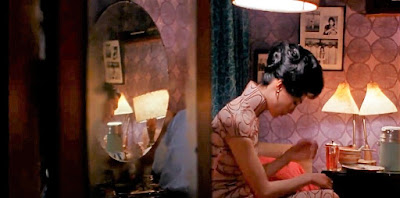Wong Kar Wai's 2000 movie touched me deeply. Even though I am not in the mood for love now, I feel a sense of closeness to the characters that I can't explain. I have never been in their situation, and I don't know how I would act if I were them, but the way they are portrayed, the mixing of emotion and daily mundane chores, their emotional intelligence and refrain, all come together in harmony.
Perhaps the aspect I love the most of the movie is its ability to make small spaces look beautiful. I grew up in an aging city where people cram into small apartments, small houses. The alleys that we see in the movie are also there in my childhood. I still have dreams of navigating the winding, dark, unattended alleys. But Wong Kar Wai uses these unappealing places as a setting for the beautiful emotions that arise between the leads. Suddenly the memories of my childhood that I consider to be ugly and abandoned, come to life with vibrant colours, dazzling patterns.
I also loved the use of mirrors to make small spaces look big, and expands the mental space of the scene. The two characters who are in love are framed by their families and by the apartments they live in, but when they are in love, they live beyond the confines of the space. There are many scenes where the two characters don't look at each other, but their reflections in mirrors of different angles reveal the same emotion, sometimes happiness, sometimes weariness.
Some people interpret the feeling of the movie to be quite pessimistic. These are lost opportunities of love, dying of youth and lack of freedom. But I see this story as two people sharing company, sympathizing with each other and helping one another through loneliness. I interpret the character's choices as deliberate actions. When they choose not to come together, run away or act on their impulses, they demonstrate immense control over their lives. In the end, their unconsummated love remains pure like a fantasy, and they still have their family, career. What is Wong Kar Wai's point here? That love is a mood that passes through, but duty and discipline will build things that last? Maybe that's too much of an old-fashioned interpretation, but in the end I admire their choices and commitment to their own morals.

Comments
Post a Comment